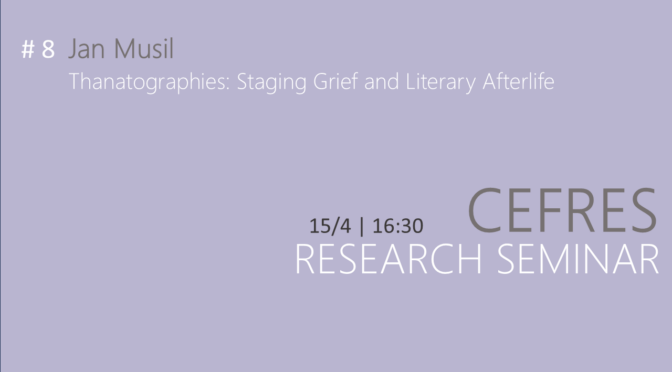Osmý seminář CEFRESu
Mezioborový seminář si klade za cíl otevírat diskusi o vědeckých metodách, přístupech a konceptech. Účastníkům umožňuje vzájemně porovnávat své vědecké přístupy a seznamovat se s aktuálními tématy výzkumu napříč obory humanitních věd.
Místo konání: knihovna CEFRESu a online (odkaz k přípojení a text ke čtení, prosím, požadujte na adrese cefres@cefres.cz)
Datum: úterý, 15. dubna 2025, 16:30
Jazyk: angličtina
Jan MUSIL (Filozofická fakulta Univerzity Karlovy / doktorand přidružený k CEFRESu)
Diskutující: Hélène MARTINELLI (CEFRES / École normale supérieure de Lyon)
Text ke čtení: Gorer, Geoffrey. “The Pornography of Death.” Encounter., vol. 5, no. 4, 1955.
Abstrakt:
Ve dvacátém století se vlivem postupného vytrácení křesťanské představy posmrtného života začala smrt znovu považovat za reálnou a fatální možnost ukončení života jednotlivce s jediným cílem, a sice vytvořit z ní zavrženíhodné a tabuizované téma. Jak v roce 1955 provokativně podotýká Geoffrey Gorer, takové téma je západní kultuře přístupné pouze prostřednictvím hypertrofovaných žánrů literatury a filmu, které souhrnně nazývá pornografií smrti.
V protikladu k tomuto tvrzení stojí próza o životě a smrti, která se začíná šířit v druhé polovině 20. století a která nezneužívá téma nemoci, umírání, smrti a především truchlení nad ztrátou milované osoby. Naopak je považuje za výchozí bod na cestě k pochopení smrtelnosti bez nutného uchylování se k neopodstatněné naději na shledání či zveličování skrze žánrové zápletky. Thanatografie, které jsou autobiografického/autofikčního charakteru, lze podle Paula Ricoeura chápat jako rekonfigurace různých tropů spjatých se smrtí a resignifikace zesílené zkušenosti smrtelnosti, které zároveň představují posturu (Jérôme Meizoz) spisovatele, jehož cílem je autentické ztvárnění předpokládané extraliterární zkušenosti (William Watkin). Mým cílem je oprostit čtení thanatografií od psychologických/psychoanalytických domněnek reformulováním Freudova široce používaného termínu “práce s truchlením” na “hru s truchlením”. a zaměřit se tak spíše na literární prostředky zobrazování truchlení. Na vybraných dílech spisovatelů, jako jsou Peter Handke, Péter Esterházy, pak vidíme, jak se k „moderní“ ztrátě a smrti často přistupuje nepřímo a následný zármutek je, v souladu s romantickou tradicí, zobrazován autenticky s využitím různých tropů nevyjádřitelnosti, jako je metafikce, intertextualita a fragmentace. A konečně, na základě posmrtně vydaného rukopisu Jana Patočky „Fenomenologie posmrtného života“, který nápadně zdůrazňuje roli literatury, navrhuji rozumět thanatografiím jako jednomu ze způsobů reinterpretace a aktualizace našeho vztahu k zemřelým.
Kompletní program semináře pro 2024-2025 naleznete zde.

